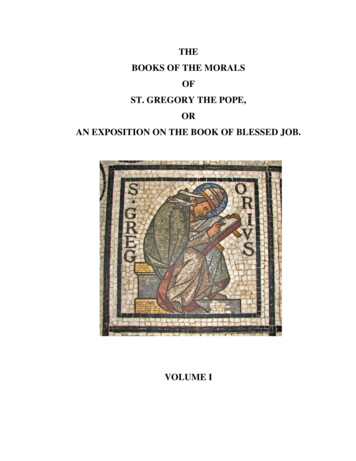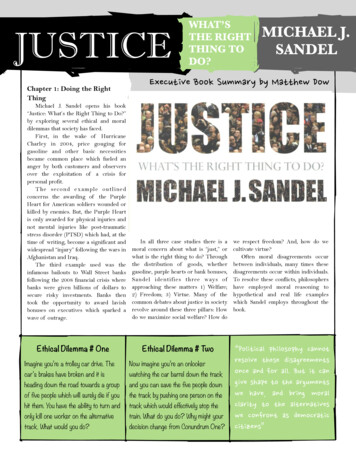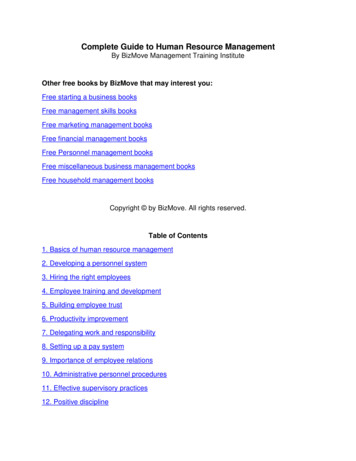
Transcription
THEBOOKS OF THE MORALSOFST. GREGORY THE POPE,ORAN EXPOSITION ON THE BOOK OF BLESSED JOB.VOLUME I
I. MORALIA - GREGORY2THEBOOKS OF THE MORALSOFST. GREGORY THE POPE,ORAN EXPOSITION ON THE BOOK OF BLESSED JOB.VOLUME I 1VOLUME I - THE FIRST PART.THE EPISTLE,Wherein he explains the time, occasion, division, plan, and the method ofdiscourse and of interpretation pursued in his work.To the Most Devout and Holy Brother, my fellow Bishop Leander [a],Gregory, the servant of God's servants.I. WHEN I knew you long since at Constantinople, my most blessed brother, atthe time that I was kept there by the affairs [b] of the Apostolical See, and thatyou had been brought thither by an embassage, with which you were charged, oncounts touching the faith of the Wisigoths [c], I then detailed in your ears all thatdispleased me in myself, since for late and long I declined the grace ofconversion, and after that I had been inspired with an heavenly affection I thoughtit better to be still shrouded in the secular habit. For though I had now disclosedto me what I should seek of the love of things eternal, yet long-established customhad so cast its chains upon me, that I could not change my outward habit: andwhile my purpose [animus] still compelled me to engage in the service of thisworld as it were in semblance only, many influences began to spring up againstme from caring for this same world, so that the tie which kept me to it was nowno longer in semblance only, but what is more serious, in my own mind. Atlength being anxious to avoid all these inconveniences, I sought the haven of themonastery, and having left all that is of the world, as at that time I vainlybelieved, I came out naked from the shipwreck of human life. For as the vesselthat is negligently moored, is very often (when the storm waxes violent) tossed bythe water out of its shelter on the safest shore, so under the cloak of theEcclesiastical office, I found myself [d] plunged on a sudden in a sea of secularmatters, and because I had not held fast the tranquillity of the monastery when in1From this source: ex.html
I. MORALIA - GREGORY3possession, I learnt by losing it, how closely it should have been held. Forwhereas the virtue of obedience was set against my own inclination to make metake the charge of ministering at the holy Altar, I was led to undertake that uponthe grounds of the Church requiring it [sub Ecclesiae colore], which, if it mightbe done with impunity, I should get quit of by a second time withdrawing myself;and subsequently notwithstanding my unwillingness and reluctance, at the verytime when the ministry of the Altar was a heavy weight, the further burden of thePastoral charge was fastened on me, which I now find so much the moredifficulty in bearing, as I feel myself to be unequal to it, and as I cannot takebreath in any comfortable assurance in myself. For because, now that the end ofthe world is at hand, the times are disturbed by reason of the multiplied evilsthereof, and we ourselves, who are supposed to be devoted to the inner mysteries,are thus become involved in outward cares; just as it happened then also when Iwas brought to the ministry of the Altar, this was brought about for me withoutmy knowledge, viz. that I should receive the mighty charge of the Holy Order, tothe end that I might be quartered under less restraint [licentious excubarem] in anearthly palace, whither indeed I was followed by many of my brethren from themonastery, who were attached to me by a kindred affection [germana]. Whichhappened, I perceive, by Divine dispensation, in order that by their example, asby an anchored cable, I might ever be kept fast to the tranquil shore of prayer,whenever I should be tossed by the ceaseless waves of secular affairs. For totheir society I fled as to the bosom of the safest port from the rolling swell, andfrom the waves of earthly occupation; and though that office which withdrew mefrom the monastery had with the point of its employments stabbed me to death asto my former tranquillity of life, yet in their society, by means of the appeals ofdiligent reading, I was animated with the yearnings of daily renewedcompunction. It was then that it seemed good to those same brethren, you tooadding your influence, as you yourself remember, to oblige me by the importunityof their requests to set forth the book of blessed Job; and as far as the Truthshould inspire me with powers, to lay open to them those mysteries of such depth;and they made this too an additional burden which their petition laid upon me,that I would not only unravel the words of the history in allegorical senses, butthat I would go on to give to the allegorical senses the turn of a moral exercise,with the addition of somewhat yet harder, that I would crown [or ‘fortify,’cingerem] the several meanings with testimonies, and that the testimonies, whichI brought forward, should they chance to appear involved, should be disentangledby the aid of additional explanation.II. At first however, when in this obscure work, which hitherto had beenthoroughly treated by none before us, I learnt the extent and character of the task
I. MORALIA - GREGORY4to which I was forced, being overcome and wearied with the mere burthen ofhearing of it, I confess that I sank under it. Yet immediately, when, in a straitbetween my alarms and my devout aspirations, I lifted up the eyes of my mind tothe Bestower of all gifts [James 1, 17], waiving my scruples, I fixed my thoughtson this, that what an affection flowing from the hearts of my brethren enjoinedupon me, could not certainly be impossible, I despaired, indeed, of being a matchfor these things, but, stronger for my very despair of myself, I forthwith raised myhopes to Him, by Whom the tongue of the dumb is opened, Who maketh the lipsof babes to speak eloquently, [Wisd. 10, 21], Who has marked theundistinguished and brute brayings of an ass with the intelligible measures ofhuman speech. What wonder, then, that a simple man should receiveunderstanding from Him, Who whenever He willeth, utters His truth by themouths of the very beasts of burthen? Armed then with the strength which thisthought supplied, I roused mine own drought to explore so deep a well; andthough the life of those, to whom I was compelled to give my interpretation, wasfar above me, yet I thought it no harm if the leaden pipe should supply streams ofwater for the service of men. Whereupon, without further delay, I delivered theformer parts of the book, in presence, to the same brethren assembled before me;and because I found my time to be then somewhat more free, in treating of thelatter portion I used dictation; and when longer intervals of time were at mydisposal, many things being added, a small number omitted, and some few left asthey were, all that had been taken down in my presence as I spoke, I arranged inbooks with amendments. For when I was giving the last part by dictation, I inlike manner carefully considered the style in which I had spoken the first part, sothat my business was both with regard to those parts, which I had given orally, bygoing through them with a careful correction, to bring them up to somewhat likedictation, and with regard to what I had dictated, that it should not greatly differfrom the style of colloquial delivery; so that the one being drawn out, and theother contracted, that which unlike modes produced might be formed into a notinconsistent whole. Though it must be added that the third portion of this work Ihave so left for the most part as I gave it by word of mouth, because the brethren,drawing me away to other things, would not have this to be corrected with anygreat degree of exactness. Pursuing my object of obeying their instructions,which I must confess were sufficiently numerous, now by the work of exposition,now by the flights of contemplation, and now by moral instruction, I havecompleted this work extending through thirty-five books [volumina], and sixtomes [codicibus], and hence I shall be often found therein to put rather in thebackground the order of exposition, and to employ myself at greater length uponthe wide field of contemplation and of moral instruction. But yet whosoever isspeaking concerning God, must be careful to search out thoroughly whatsoever
I. MORALIA - GREGORY5furnishes moral instruction to his hearers; and should account that to be the rightmethod of ordering his discourse, if, when opportunity for edification requires it,he turn aside for a useful purpose from what he had begun to speak of; for he thattreats of sacred writ should follow the way of a river, for if a river, as it flowsalong its channel, meets with open valleys on its side, into these it immediatelyturns the course of its current, and when they are copiously supplied, presently itpours itself back into its bed. Thus unquestionably, thus should it be witheveryone that treats of the Divine Word, that if, in discussing: any subject, hechance to find at hand any occasion of seasonable edification, he should, as itwere, force the streams of discourse towards the adjacent valley, and, when hehas poured forth enough upon its level of instruction, fall back into the channel ofdiscourse which he had proposed to himself.III. But be it known that there are some parts, which we go through in a historicalexposition, some we trace out in allegory upon an investigation of the typicalmeaning, some we open in the lessons of moral teaching alone, allegoricallyconveyed, while there are some few which, with more particular care, we searchout in all these ways together, exploring them in a threefold method. For first, welay the historical foundations; next, by pursuing the typical sense, we erect afabric of the mind to be a strong hold of faith; and moreover as the last step, bythe grace of moral instruction, we, as it were, clothe the edifice with an overcastof colouring. Or at least how are the declarations of truth to be accounted of, butas food for the refreshment of the mind? These being handled with the alternateapplication of various methods, we serve up the viands of discourse in such sortas to prevent all disgust in the reader, thus invited as our guest, who, uponconsideration of the various things presented to him, is to take that which hedetermines to be the choicest. Yet it sometimes happens that we neglect tointerpret the plain words of the historical account, that we may not be too long incoming to the hidden senses, and sometimes they cannot be understood accordingto the letter, because when taken superficially, they convey no sort of instructionto the reader, but only engender error; for here, for instance, it is said, UnderWhom they are bent who bear the world. [Job 9, 13]. Now in the case of one sogreat, who can be ignorant that he never so fol1ows the vain fictions of the poets,as to fancy the weight of the world to be supported by the labour of the giants.Again, under the pressure of calamities he exclaims, So that my soul choosethstrangling, and death rather than life. [Jov 7, 15] Now who that is in his rightsenses could believe that a man of so high praise, who in a word, we know,received from the Judge of that which is within the reward of the virtue ofpatience, settled amidst his afflictions to finish his life by strangling? Andsometimes even the very literal words forbid its being supposed that perchance
I. MORALIA - GREGORY6they ought to be understood according to the letter. Thus he says, Let the dayperish wherein I was born, and the night in which it was said, There is a manchild conceived. [Job 3, 3] And a little while afterwards he subjoins, Let darknessseize it, and let it be involved in bitterness. [ver. 5] And in cursing the same nighthe adds, Lo! let that night be solitary. Assuredly this day of his birth, whichrolled itself out in the mere current of time, could never stand fast. In what waythen did he wish it might be involved in darkness? For having gone by, it nolonger was, neither yet, if it had existence in the nature of things, could it everfeel bitterness; it is evident therefore that the words cannot possibly be spoken ofa day without feeling, when the wish expressed is that it be struck with a feelingof bitterness; and if the night of his conception had gone by, blended with theother nights, after what fashion would he have it become solitary, which as itcould not be arrested from the flight of time, so neither could it be separated fromunion with the other nights. Again he says, How long wilt Thou not depart fromme, nor let me alone, till I swallow down my spittle. [Job 7, 19] Yet he had said alittle above, The things which my soul refused to touch are as my sorrowful meat.[Job 6, 7] Now who does not know that spittle is more easily swallowed thanfood? it is wholly inconceivable then in what connection he, who tells of histaking food, declares that he cannot swallow his spittle. Again he says, I havesinned; what shall I do unto thee, O Thou preserver of men? [Job 7, 20] Or moreunequivocally, Wouldest Thou destroy me by the iniquities of my youth. [Job 13,26] And yet in another answer he subjoins, My heart shall not reproach me solong as I live. [Job 27, 6] How then does his heart not condemn him so long as helives, who by a public avowal testifies that he has been a sinner, for faultiness ofpractice and acquittal of conscience can never meet together. Yet doubtlesswhereas the literal words when set against each other cannot be made to agree,they point out some other meaning in themselves which we are to seek for, as ifwith a kind of utterance they said, Whereas ye see our superficial form to bedestructive to us, look for what may be found within us that is in place andconsistent with itself.IV. But sometimes, he who neglects to interpret the historical form of wordsaccording to the letter, keeps that light of truth concealed which is presented tohim, and in laboriously seeking to find in them a further interior meaning, heloses that which he might easily obtain on the outside. Thus the Saint saith, if Ihave withheld the poor from their desire, or have caused the eyes of the widow tofail; or have eaten my morsel myself alone, and the fatherless hath not eatenthereof; . . . if I have seen any perish for want of clothing, or any poor withoutcovering; if his loins have not blessed me, and if he were not warmed with thefleece of my sheep; [Job 31, 16-20] where it is to be observed, that if these words
I. MORALIA - GREGORY7be violently strained to an allegorical signification, we make void all his acts ofmercy. For as the word of God, by the mysteries which it contains, exercises theunderstanding of the wise, so usually by what presents itself on the outside, itnurses the simple-minded. It presenteth in open day that wherewith the little onesmay be fed; it keepeth in secret that whereby men of a loftier range may be heldin suspense of admiration. It is, as it were, a kind of river, if I may so liken it,which is both shallow [planus] and deep, wherein both the lamb may find afooting, and the elephant float at large. Therefore as the fitness of each passagerequires, the line of interpretation is studiously varied accordingly, in that the truesense of the word of God is found out with so much the greater fidelity, inproportion as it shifts its course through the different kinds of examples as eachcase may require.V. This exposition being such as I have described, I have transmitted to yourBlessedness for your inspection, not as being due for its worth's sake, but becauseI remember that I promised it on your making the request. In which whatsoeveryour Holiness may discover that is languid or unpolished, let it be most readilyexcused in proportion as the circumstance is known that it was said in a state ofsickness; for when the body is worn down with sickness, the mind being alsoaffected, our exertions to express ourselves likewise become faint. For many ayear's circuit has gone by since I have been afflicted with frequent pains in thebowels, and the powers of my stomach being broken down, makes me at all timesand seasons weakly; and under the influence of fevers, slow, but in constantsuccession, I draw my breath with difficulty; and when in the midst of thesesufferings I ponder with earnest heed, that according to the testimony ofScripture, He scourgeth every son whom He receiveth; [Heb. 12, 6] the more I amweighed down by the severity of present afflictions, from my anticipations foreternity, I gather strength to breathe with so much the better assurance. Andperchance it was this that Divine Providence designed, that I a stricken one,should set forth Job stricken, and that by these scourges I should the moreperfectly enter into the feelings of one that was scourged. Yet it will be evident toall that consider the thing aright, that bodily ailment hinders the pursuits whereinI labour, and that with no slight power of opposition in this respect, that, when thepowers of the flesh are not strong enough to discharge the office of speech, themind cannot adequately convey its meaning. For what is the office of the bodysaving to be the organ of the mind; and though the musician be ever so skilled inplaying [cantandi], he cannot put his art in practice unless outward aids accordwith himself for that purpose, for we know that the melody [canticum] which thehand of the proficient bids, is not rightly given back by instruments that are out oforder; nor does the wind express his art, if the pipe, gaping with crevices, gives a
I. MORALIA - GREGORY8grating sound. How much more affected in quality then is a thing like thisexposition of mine, wherein the grace of delivery is so dissipated by the brokencondition of the instrument, that no contrivance of skill can avail to recover it!But I beg that in going through the statements of this work, you would not seekthe foliage of eloquence therein: for by the sacred oracles the vanity of a barrenwordiness is purposely debarred those that treat thereof, in that it is forbidden toplant a grove in the temple of God. And doubtless we are all of us aware, that asoften as the overrank crop shews stalks that abound in leaves, the grains of theears are least filled and swelling. And hence that art of speaking itself, which isconveyed by rules of worldly training, I have despised to observe; for as the tenorof this Epistle also will tell, I do not escape the collisions of metacism, nor do Iavoid the confusion of barbarisms, and I slight the observing of situations andarrangements, and the cases of prepositions; for I account it very far from meet tosubmit the words of the divine Oracle to the rules of Donatus. For neither arethese observed by any of the translators thereof, in the authoritative [auctoritate]text of Holy Writ. Now as my exposition takes its origin from thence, it is plainlymeet that this production, like a kind of offspring, should wear the likeness of itsmother. Now it is the new Translation that I comment on; but when a case to beproved requires it, I take now the new and now the old for testimony, that as theApostolic See, over which I preside by ordinance of God, uses both, the laboursof my undertaking may have the support of both.[a] Leander, who is honoured as a Saint and Doctor in Spain, was a native ofCarthagena; his father Severianus was brother in law to Theodoric king of theOstrogoths. He early devoted himself to a monastic life, and after a longcontinuance in it he was made Bishop of Seville, where he maintained the Faithagainst the Arianism which then prevailed, and received Herminigild, whoreigned there under his father Liuvigild, into the church. He went on an embassyto the Emperor Tiberius as presently stated, after which he returned to Spain, butwas banished for a time by Liuvigild, who, however, on his deathbed appointedhim tutor to his son Recared, whom he converted from Arianism, and with hisassistance established the Catholic Faith amongst the Wisigoths and Suevi. Hetook part (and perhaps presided, see Baronius An. 589. s. ix. and xliv. Boll. Act.Sanct. Ap. xiii. p. 277.) in the third Council of Toledo, in which the Goths wereunited to the Catholic Church, A.D. 589. He died in 595. He wrote a rule forVirgins to his sister Florentina, which is extant in Holstein's Codex Regularum, aHomily of his, on the conversion of the Goths, accompanies the acts of the Synodof Toledo, and the Mozarabic Missal is said by some to be founded on one
I. MORALIA - GREGORY9arranged by him; his other works are lost. See Cave, Hist. Lit. an. 585. also theIsidoriana of Arevalus in his edition of St. Isidore, Rome 1797. There are threeepistles of St. Gregory to Leander, Lib. i. Ep. 43, companying the Pallium. Hisbrother Fulgentius, Bp. of Carthagena and Eceja, Bolland. Jan. xiv. p. 971. andhis sister Florentina, Ap. xiv. and Jun xx. who devoted herself to a life ofVirginity, are locally honoured as Saints. He was succeeded in the See of Seville(then called Hispalis,) by his younger brother St. Isidore.[b] Responsa, these were all matters concerning the Roman See, that werebrought under the notice of the Emperor, and the person intrusted with them wasentitled Apocrisiarius. He was the Pope's Ambassador at the Imperial Court withvarying powers. He was one of the Cardinal Deacons, for which reason S. Greg.on being appointed to this office was ordained Deacon, vide Du Cange in voceApocrisiarius; also Bingham Antiq. b. iii. c. xiii. s. 6. where the office is correctlydescribed. vide Baronius Ann. tom. x. p. 378. (an. 583. xii. xiii.) Gibbon speaksof St. Gregory's services at the Imperial Court thus; 'As soon as he had receivedthe character of Deacon Gregory was sent to reside at the Imperial Court, and heboldly assumed in the name of St. Peter a tine of independent dignity whichwould have been criminal and dangerous in the most illustrious layman of theempire." See his history x.xlv. Lond. 1813. t. viii. p. 164. also p. 143.[c] Herminigild was deposed by Liuvigild, chiefly, it seems, for embracing theCatholic Faith. The contemporary writers however, both St. Gregory of Toursand St. Isidore, consider him to have acted wrongly toward his father. Baroniousindeed says that Leander went on an embassy to ask help for him from theEmperor, which he obtained, but the Greed officers betrayed his cause. Anancient Roman Breviary however says he went to Constantinople to attend theCouncil, 'Pro confirmandis capitulis Sanctae Trinitatis,' to confirm the articles onthe Holy trinity. This he may have done previously, the fifth General Councilbeing A.D. 553. Herminigild was unsuccessful, and obliged to leave hiskingdom.He found means however to return into Spain, and maintained himself by the helpof the Greeks against his father, and it is at this time that his conduct inattempting a surprise is severely blamed by St. Gregory of Tours, Hist. Franc. vi.43. He was at last overpowered, and taken prisoner. St. Gregory of Rome, Dial.iii. 31, says, that he was then urged by his father to communicate with an ArianBishop, and after resisting alike promises and threats, was put to death. he alsomentions a supernatural light that surrounded his body. These circumstances arenot noticed by St. Isidore or St. Greg. of Tours. Liuvigild however very soon
I. MORALIA - GREGORY10after acknowledged privately the true faith, and recalled Leander, and placed hisson and successor Recared under his direction. Herminigild is honoured as aMaryr by the Latin Church, Apr. 13. See Isidorianna caps. xviii. and lxxxix. S.Isid. hist. Goth. c. 49. The account of Mariana is more circumstantial, but seemspartly imaginary.[d] He was sent to Constantinople as Apocrisiarius immediately upon hisordination, Bar. an. 583. The Benedictive Biographer places the event earlier, in578 or 579. life l. i. c. 5. op. t. iv. p. 211.
I. MORALIA - GREGORY11BOOK I.The first verses of the first chapter of the Book of Job are explained firsthistorically, then in an allegorical, and lastly in a moral sense.HISTORICAL INTERPRETATION.1. There was a man in the land of Uz, whose name was Job. [Job 1, 1] It is forthis reason that we are told where the holy man dwelt, that the meritoriousness ofhis virtue might be expressed; for who knows not that Uz is a land of theGentiles? and the Gentile world came under the dominion of wickedness, in thesame proportion that its eyes were shut to the knowledge of its Creator. Let usbe told then where he dwelt, that this circumstance may be reckoned to his praise,that he was good among bad men; for it is no very great praise to be good incompany with the good, but to be good with the bad; for as it is a greater offencenot to be good among good men, so it is immeasurably high testimony for anyone to have shewn himself good even among the wicked. Hence it is that thesame blessed Job bears witness to himself, saying, I am a brother to dragons, anda companion to owls. [Job 30, 29] Hence it was that Peter extolled Lot with highcommendation, because he found him to be good among a reprobate people;saying, And delivered just Lot, vexed with the filthy conversation of the wicked;for he was righteous in seeing and hearing [so Vulg.], dwelling with them whovexed his righteous soul from day to day with their unlawful deeds. [2 Pet. 2,7.8.] Now he evidently could not have been vexed unless he had both heard andwitnessed the wicked deeds of his neighbours, and yet he is called righteous bothin seeing and in hearing, because their wicked lives affected the ears and eyes ofthe Saint not with a pleasant sensation, but with the pain of a blow. Hence it isthat Paul says to his disciples, In the midst of a crooked and perverse nation,among whom ye shine like lights in the world. [Phil. 2, 15] Hence it is said to theAngel of the Church of Pergamos, I know thy works,and where thou dwellest,even where Satan's seat is; and thou holdest fast My name, and hast not deniedMy faith. [Rev. 2, 13] Hence the Holy Church is commended by the voice of theSpouse, where He says to her in the Song of love, As the lily among the thorns, sois my love among the daughters. [Cant. 2, 2] Well then is the blessed Jobdescribed, (by the mention of a gentile land,) as having dwelt among the wicked,that according to the testimony borne by the Spouse, be might be shewn to havegrown up a lily among thorns, for which reason it is well subjoined immediatelyafter,And that man was simple [so Vulg.] and upright.
I. MORALIA - GREGORY12[ii]2. For there are some in such wise simple as not to know what uprightness is, butthese walk wide of the innocence of real simplicity, in proportion as they are farfrom mounting up to the virtue of uprightness; for while they know not how totake heed to their steps by following uprightness, they can never remain innocentby walking in simplicity. Hence it is that Paul warns his disciples, and says, Butyet I would have you wise unto that which is good, and simple concerning evil.[Rom. 16, 19] Hence again he says, Brethren, be not children in understanding,howbeit in malice be ye children. [1 Cor. 14, 20] Hence Truth enjoins Herdisciples by Her own lips, saying, Be ye wise as serpents and harmless as doves.[Mat. 10, 16] For in giving them admonition, He needfully joined the twotogether, so that both the simplicity of the dove might be instructed by thecraftiness of the serpent, and again the craftiness of the serpent might beattempered by the simplicity of the dove. Hence it is that the Holy Spirit hasmanifested His presence to mankind, not in the form of a dove only, but also inthe form of fire. For by the dove simplicity is indicated, and by fire, zeal.Therefore He is manifested in a dove, and in fire, because all they, who are full ofHim, yield themselves to the mildness of simplicity, in such sort as yet to kindlewith a zeal of uprightness against the offences of sinners. It follows,And one ,that feared God and eschewed evil.[iii]3. To fear God is never to pass over any good thing, that ought to be done.Whence it is said by Solomon, Whoso fears God, neglects nothing [Eccl. 7, 18,(Vulg.) 19.]; but because there are some, who practise some good actions, yet insuch wise that they are by no means withheld from certain evil practices; after heis said to have been one that feared God, it is still rightly reported of him that healso eschewed evil; for it is written, Depart from evil, and do good [Ps. 37, 27];for indeed those good actions are not acceptable to God, which are stained in Hissight by the admixture of evil deeds; and hence it is said by Solomon, He whooffendeth in one point, spoileth many good deeds [Eccl. 9, 18]. Hence Jamesbears witness, saying, For whosoever shall keep the whole law, and yet offend inone point, he is guilty of all. [James 2, 10] Hence Paul saith, A little leavenleaveneth the whole lump [1 Cor. 5, 6]. So then that it might be shewn us howspotless the blessed Job stood forth in his good actions, it is wisely done that wehave it pointed out how far he was removed from evil deeds.
I. MORALIA - GREGORY134. But it is the custom of narrators, when a wrestling match is woven into thestory, first to describe the limbs of the combatants, how broad and strong thechest, how sound, how full their muscles swelled, how the belly below neitherclogged by its weight, nor weakened by its shrunken size, that when they havefirst shewn the limbs to be fit for the combat, they may then at length describetheir bold and mighty strokes. Thus because our athlete was about to combat thedevil, the writer of the sacred story, recounting as it were before the exhibition inthe arena the spiritual merits in this athlete, describes the members of the soul[mentis], saying, And that man was perfect and upright, and one that feared God,and eschewed evil; that when the powerful setting of the limbs is known, fromthis very strength we may already prognosticate also the victory to follow. Nextcomes,[
AN EXPOSITION ON THE BOOK OF BLESSED JOB. VOLUME I 1 VOLUME I - THE FIRST PART. THE EPISTLE, Wherein he explains the time, occasion, division, plan, and the method of discourse and of interpretation pursued in his work. _ To the Most Devout and Holy Brother, my fellow Bishop Leander [a] , Gregory, the servant of God's servants.










